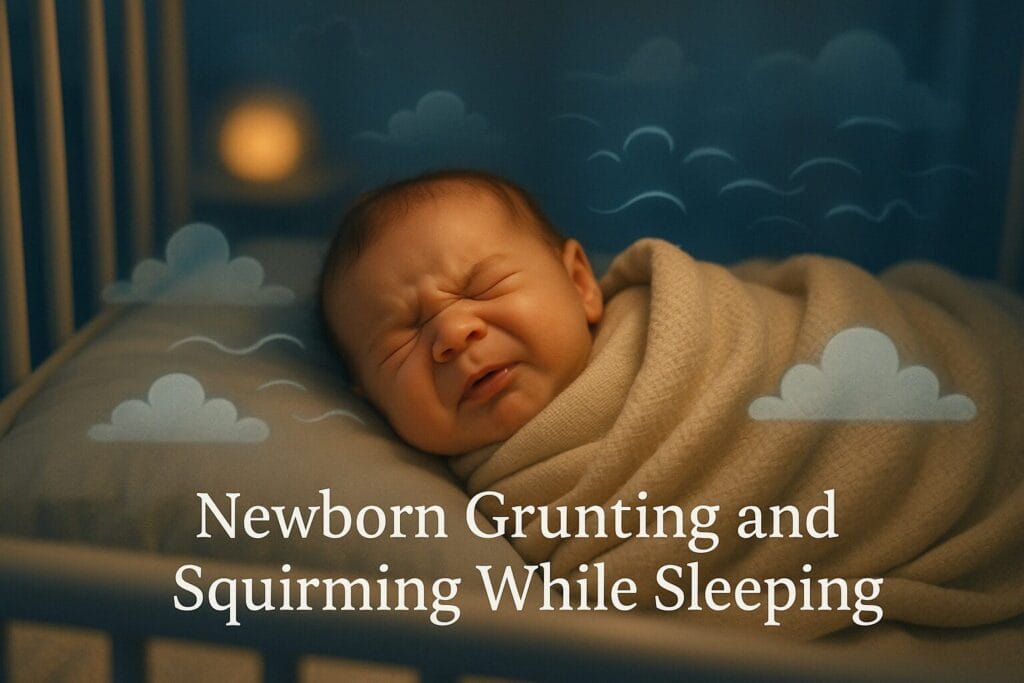As a parent, hearing your newborn grunt and squirm while sleeping can be worrying. You might wonder if these noises signify discomfort or are part of their normal development. The truth is, newborn grunting and squirming while sleeping is common and usually nothing to be concerned about. This article will explore what these behaviors mean, why they happen, and how they relate to your baby’s growth.
Table of Contents
Understanding the Causes of Newborn Grunting and Squirming While Sleeping

Newborn grunting and squirming while sleeping can concern parents, mainly when these behaviors occur frequently. However, these noises are often a regular part of a baby’s development and shouldn’t cause unnecessary worry. In this section, we’ll explore the main reasons behind newborn grunting and squirming while sleeping and what they mean for your baby’s health.
Immature Digestive System: Why Newborn Grunting and Squirming While Sleeping Is Linked to Gas and Discomfort
An immature digestive system is one of the primary causes of newborn grunting and squirming while sleeping. During the first few weeks, newborns often struggle with gas and discomfort as their digestive systems adapt to processing milk. This can lead to grunting and squirming during sleep, which may seem alarming, but it’s typically part of normal development.
As your baby’s digestive system matures, you’ll notice that the grunting and squirming while sleeping will become less frequent. Although this behavior is common, it’s important to comfort your baby by ensuring they are adequately fed and burped to reduce discomfort from gas. As your baby grows, you’ll notice fewer sounds during sleep.
Sleep Cycles and Reflexes: How Newborn Grunting and Squirming While Sleeping Relate to Sleep Stages
Newborn grunting and squirming while sleeping are often connected to how babies experience sleep cycles. Newborns spend a significant amount of time in light sleep, where their bodies are more prone to involuntary reflexes. These reflexes, such as sudden jerks or muscle movements, can cause your baby to grunt and squirm during sleep, which is entirely normal.
This grunting and squirming while sleeping is also a sign that your baby’s nervous system is developing. As your baby matures and their sleep cycles stabilize, the frequency of these movements will naturally decrease. Over time, the grunting and squirming during sleep will likely lessen as their muscles relax and their sleep patterns become more consistent.
Teething can cause babies to sleep more due to increased discomfort and fatigue. In this article, we’ll explore five proven reasons for this and offer tips on how to help your baby through the teething process.
Newborn’s Muscle Development: Grunting and Squirming While Sleeping as Part of Physical Growth
Another cause of newborn grunting and squirming while sleeping is muscle development. Newborns are still learning how to control their muscles, and this development often manifests through grunting and squirming during sleep. As their muscles grow stronger and more coordinated, the frequency of these noises typically decreases.
The grunting you hear during your baby’s sleep is a regular part of their physical growth. While this process can be noisy sometimes, it’s just another sign that your baby’s muscles are developing and becoming more controlled. As your baby matures, you’ll notice a reduction in the grunting and squirming while sleeping.
When Should You Be Concerned About Newborn Grunting and Squirming While Sleeping?
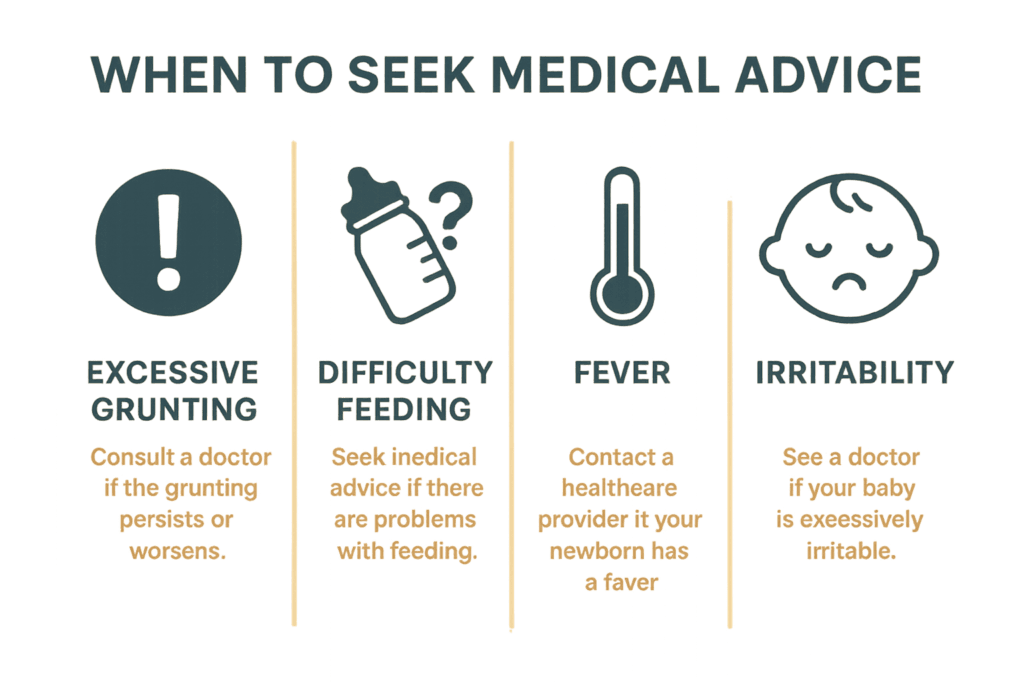
While newborn grunting and squirming while sleeping are usually harmless, there are cases when they could indicate an underlying health issue. As a parent, it’s essential to understand the signs that may suggest your baby needs medical attention. This section will help you recognize when the usual newborn grunting and squirming while sleeping could be a cause for concern.
Overtired newborns can be challenging to settle, but you can help them sleep fast and effectively with the right strategies. This article will share seven proven techniques to soothe your baby and ensure they get the rest they need.
Signs of Discomfort or Pain: How to Tell if Newborn Grunting and Squirming While Sleeping Is Related to a Medical Condition
Newborn grunting and squirming while sleeping are often signs of normal development. However, if your baby excessively grunts or squirms unusually, it could indicate discomfort or pain. Look for additional signs like persistent crying, trouble feeding, or arching of the back, which may suggest digestive issues or reflux.
Many parents have shared their concerns about newborn grunting and squirming while sleeping on forums like Reddit, where they discuss whether these behaviors are normal or need attention. Trust your instincts—if the grunting seems different than usual or is associated with other worrying symptoms, it’s best to contact a healthcare professional.
When to Consult Your Pediatrician: Recognizing the Red Flags in Newborn Grunting and Squirming While Sleeping
If the newborn grunting and squirming while sleeping seem more frequent or intense than usual, or if other concerning signs accompany them, it may be time to consult your pediatrician. Red flags include poor weight gain, persistent discomfort, and difficulty feeding. These symptoms could point to underlying conditions like reflux or feeding intolerance.
According to the NHS guidelines on newborn grunting and squirming while sleeping, parents should seek medical advice if the behavior persists or worsens. A pediatrician can help determine whether the grunting and squirming are part of your baby’s natural development or indicate a health issue requiring treatment.
Tips to Help Your Baby Sleep Better
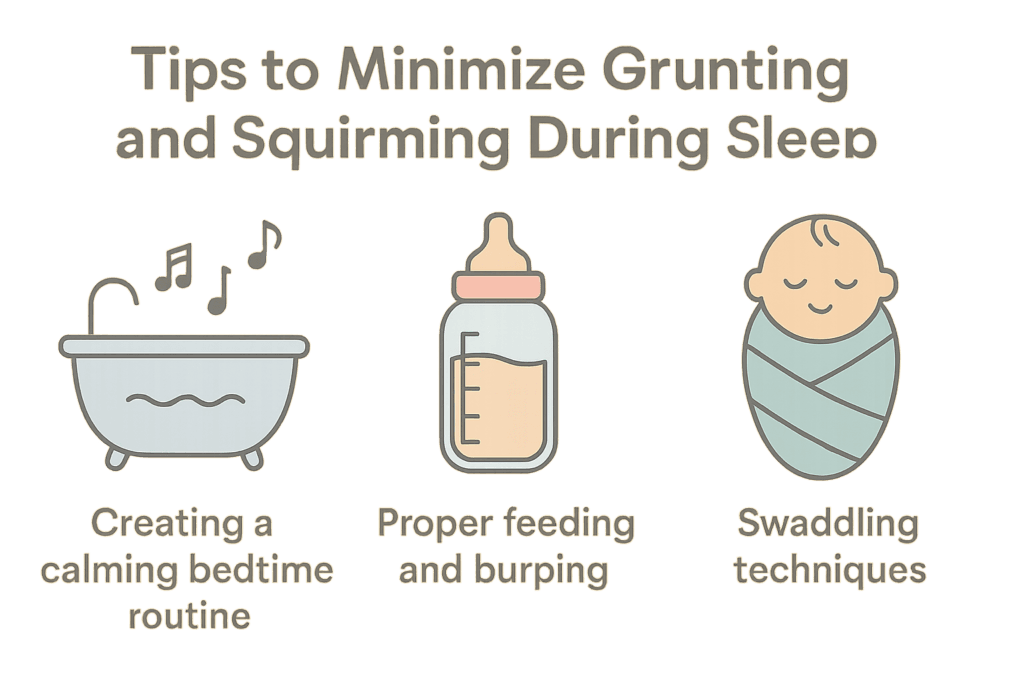
If you’ve been losing sleep over your newborn baby grunting and squirming while sleeping, you can take several steps to improve their comfort and help them rest better. These nighttime behaviors, such as newborn baby grunts and squirms while sleeping, are common but can still cause worry for parents. In this section, we’ll offer practical tips to help when your newborn baby grunts and squirms while sleeping.
Creating a Calming Bedtime Routine: How to Help Your Newborn Wind Down
A calming bedtime routine is one of the most effective ways to reduce the frequency of newborn grunts and squirms while sleeping. A consistent routine helps your baby relax and prepare for sleep. Activities like a warm bath, gentle rocking, or soft lullabies can ease your baby into a calm state, reducing the likelihood of newborn baby grunts and squirms while sleeping.
A soothing bedtime routine can help your newborn baby grunt and squirm while sleeping. This predictable process makes your baby feel secure, reducing their discomfort and leading to a more restful night.
Feeding and Positioning Tips: Helping Reduce Gas and Discomfort
Newborn baby grunts and squirms while sleeping are often linked to digestive issues, especially gas. If your baby experiences discomfort after feedings, it can cause them to grunt and squirm. To help, feed your baby upright and burp them regularly to minimize gas buildup. Additionally, holding your baby upright for 10–15 minutes after a feeding can significantly reduce the chances of the newborn baby grunting and squirming while sleeping.
Adjusting your feeding and positioning habits can help prevent the discomfort that leads to newborn baby grunts and squirms while sleeping. These small changes can make a big difference in improving your baby’s sleep quality.
Using Swaddling and Other Comforting Techniques: How to Soothe Your Baby
Swaddling is another helpful technique to reduce newborn grunts and squirms while sleeping. The snug feeling of a swaddle can help your baby feel secure and calm, mimicking the comfort of the womb. Pair swaddling with soothing techniques like gentle rocking or playing soft white noise to create a more peaceful sleep environment.
Swaddling and other comforting methods can help reduce these movements when your newborn baby grunts and squirms while sleeping. Swaddling keeps your baby secure and may prevent the startle reflex, often leading to grunting and squirming during sleep.
Can Newborn Grunting and Squirming Be Prevented?
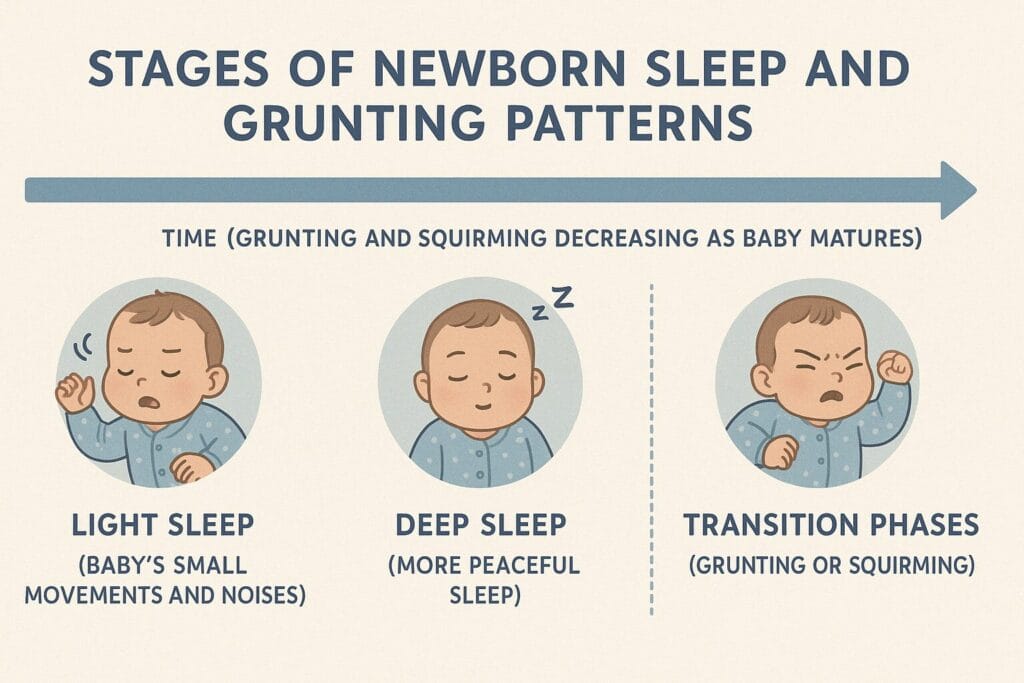
While it’s not always possible to eliminate newborn grunting and squirming while sleeping entirely, you can minimize the behavior and help your newborn sleep more peacefully. Many parents of newborns grunting and squirming while sleeping have shared strategies to reduce these nighttime noises. Here are some practical ways to address and prevent newborn grunting and squirming while sleeping.
Feeding and Digestive Health: Preventing Gas and Discomfort
One of the most common causes of newborn grunting and squirming while sleeping is digestive discomfort, particularly gas. To help prevent this, focus on feeding techniques that minimize air intake. Hold your baby upright during feedings and make sure to burp them regularly. Additionally, after feeding, keep your baby upright for at least 10 minutes to allow gas to pass, reducing the likelihood of newborn grunting and squirming while sleeping.
Improving your baby’s feeding and digestive health can significantly reduce the grunting and squirming associated with discomfort. Parents on newborn grunting and squirming while sleeping reddit often recommend these simple adjustments to improve sleep quality for both parents and babies.
Adjusting Sleep Environment: The Role of Sleep Position and Comfort
Creating the right sleep environment can also help minimize newborn grunting and squirming while sleeping. Ensure your baby sleeps on a firm mattress in a safe, comfortable position. A slightly inclined sleeping position can help reduce discomfort, especially if your baby experiences acid reflux. The proper sleep position can help minimize the movements that contribute to newborn grunting and squirming while sleeping.
Many parents report that adjusting their baby’s sleep environment, including their position, has helped reduce the frequency of newborn grunting and squirming while sleeping. These small changes can go a long way in ensuring your baby gets a restful sleep.
Insights from Other Parents: Online Communities
Many parents turn to online communities, like Reddit and NHS forums, to share experiences and advice about newborn grunting and squirming while sleeping. These platforms offer valuable insights from parents who are going through the same challenges. Here’s a summary of what other parents have said about their experiences with newborn grunting and squirming while sleeping.
Reddit Discussions on Grunting Babies: What Parents are Saying About Their Experiences
Parents of newborns grunting and squirming while sleeping often share similar concerns and experiences. Many mention that grunting and squirming during sleep are normal, especially during the first few weeks of life. Some parents report that their babies stop grunting and twitching as they age and their digestive systems mature. Others suggest trying different sleeping positions or swaddling to ease the discomfort that causes these behaviors.
The wealth of shared experiences on Reddit can be reassuring for parents who are unsure whether their baby’s grunting is usual. Many parents say their babies eventually outgrow the behavior, providing hope for others facing the same issue.
Advice from Health Professionals on NHS Forums: Understanding Pediatric Insights on Newborn Sleep Behavior
Health professionals on newborn grunting and squirming while sleeping, as well as NHS forums, often emphasize that grunting and squirming are typically part of a newborn’s development. Pediatricians highlight that babies’ digestive systems and sleep cycles are still maturing in the early months, which can cause them to grunt and squirm during sleep. They recommend that parents monitor their baby’s behavior and consult a doctor if the grunting is excessively loud or accompanied by signs of distress.
According to experts on NHS forums, if your baby’s grunting and squirming while sleeping are accompanied by difficulty feeding or unusual fussiness, it may be worth seeking advice. Otherwise, these behaviors are usually temporary and not a cause for concern.
Frequently Asked Questions (FAQs)
Why does my newborn grunt and squirm while sleeping?
It’s entirely normal for newborns to grunt and squirm during sleep. These behaviors are usually caused by their immature digestive system, developing sleep cycles, and muscle growth. As babies grow, these movements typically become less frequent.
Is it normal for a newborn to grunt and squirm during sleep?
Yes, newborn grunting and squirming while sleeping is quite common. Babies are still adjusting to life outside the womb, and their bodies undergo various developmental stages. Over time, as they mature, these behaviors usually decrease.
How can I reduce newborn grunting and squirming while sleeping?
To minimize newborn grunting and squirming while sleeping, try adjusting feeding techniques, ensuring proper burping after feedings, and establishing a soothing bedtime routine. Also, consider swaddling your baby and optimizing their sleep environment for better comfort.
Can newborn grunting and squirming while sleeping be a sign of discomfort?
Sometimes, yes. Newborn grunting and squirming while sleeping can signify mild discomfort due to gas or digestive issues. If these behaviors are paired with other symptoms like excessive crying or difficulty feeding, it’s a good idea to consult your pediatrician.
When should I worry about my baby’s grunting and squirming while sleeping?
If your baby’s newborn grunting and squirming while sleeping is excessively loud or accompanied by signs of distress, like poor feeding, fever, or unusual crying, it’s essential to contact a healthcare provider. Most cases are harmless, but it’s always better to be safe.
Can my baby’s sleep position affect their grunting and squirming while sleeping?
Yes! Sleep position can influence newborn grunting and squirming while sleeping. Placing your baby slightly inclined can help with gas or reflux discomfort. However, always make sure your baby sleeps on their back in a safe, firm crib to minimize the risk of sudden infant death syndrome (SIDS).
Does swaddling help with newborn grunting and squirming while sleeping?
Swaddling can help reduce newborn grunting and squirming while sleeping by giving your baby a sense of security and preventing the startle reflex. Just be sure to swaddle your baby safely, ensuring they can move their hips freely and using breathable fabrics.
How long does newborn grunting and squirming while sleeping last?
For most babies, newborn grunting and squirming while sleeping tend to last for the first few months. As your baby’s digestive system matures and they settle into more regular sleep cycles, these behaviors typically reduce.
Can newborn grunting and squirming while sleeping be related to gas?
Yes, gas is a common cause of newborn grunting and squirming while sleeping. Newborns are still learning to process food and expel gas, which can cause them to grunt or squirm during sleep. Proper burping and positioning can help reduce this discomfort.
Should I be concerned if my baby grunts and squirms at night but sleeps well during the day?
Not necessarily. It’s common for newborns to grunt and squirm while sleeping more at night. If your baby is otherwise healthy, feeding well, and active during the day, there’s likely no cause for concern. However, if you notice other unusual symptoms, it’s always a good idea to consult your doctor.
Conclusion: Ensuring Your Baby’s Well-being
While newborns grunting and squirming while sleeping may seem unnerving, it’s usually a natural part of their development. With the right knowledge and care, you can ensure your baby gets the rest it needs while feeling reassured. Understanding the causes of these behaviors and knowing when to seek help will allow you to manage your baby’s sleep patterns better.
Recap of Causes and Solutions
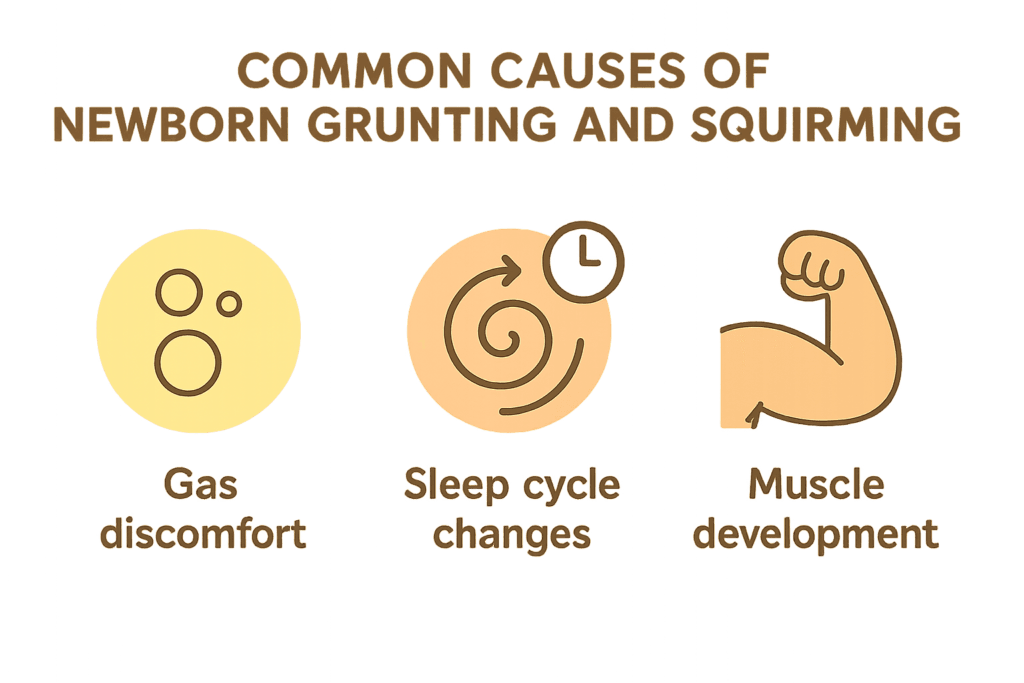
Newborn grunting and squirming while sleeping are typically caused by an immature digestive system, developing sleep cycles, or muscle growth. These behaviors are a regular part of your baby’s early months. To reduce newborn grunting and squirming while sleeping, focus on feeding techniques, ensuring a calming sleep environment, and providing comfort through swaddling. These steps can help your baby feel more secure and reduce nighttime discomfort.
The most important takeaway is that newborn grunting and squirming while sleeping are common and usually temporary. As your baby grows, these behaviors should naturally decrease, giving you more peaceful nights.
When to Seek Medical Advice for Grunting and Squirming
While newborn grunting and squirming while sleeping are usually harmless, seeking medical advice is essential if the behavior seems excessive or is accompanied by signs of distress, such as poor feeding or abnormal crying. If your baby’s grunting and squirming are persistent and you’re concerned, it’s always a good idea to consult a pediatrician to rule out any underlying issues.
By monitoring your baby’s overall well-being and understanding the typical causes of newborn grunting and squirming while sleeping, you can rest assured that you’re providing the best care for your little one.

